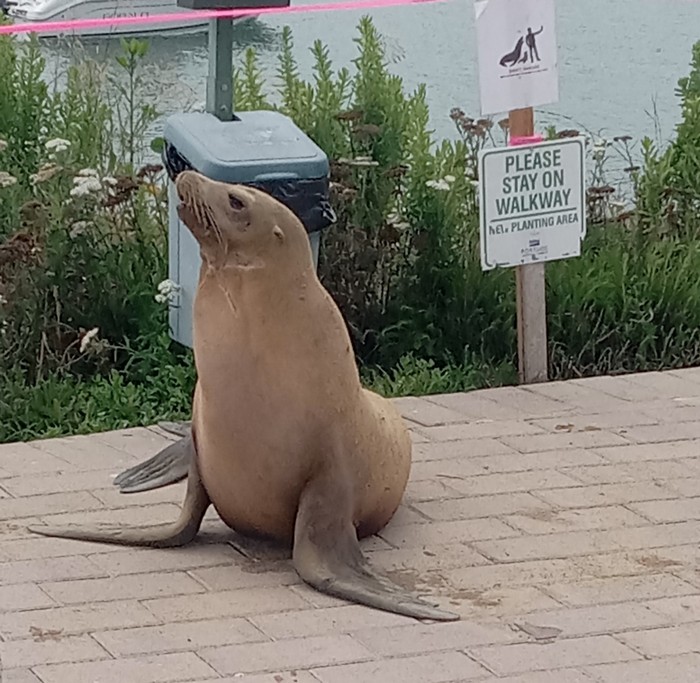Just doing what she’s told and staying on the walkway.
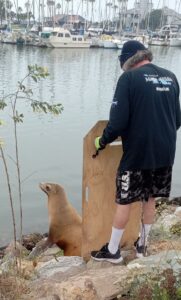
On June 17, a pregnant sea lion decided she would rather spend time on the promenade at Portside Ventura Harbor. When it became obvious, she wasn’t going back in the water the volunteer folks from the Channel Islands Marine & Wildlife Institute Rescue (CIMWI) came out to try to get her back into the water but she refused to budge.
Volunteer Seri McClendon, who was on-site, stated “Marine mammals are federally protected under the Marine Mammal Protection Act. Violations can result in a civil penalty up to $11,000 as well as criminal penalties up to $100,000 and imprisonment of up to a year or both. It is important to keep both people and pets away from stranded animals. If pets are around the area, make sure they are on a leash.”
She went on “Not all animals that seem stranded need human intervention. It is normal for seals and sea lions to come out of the water to rest, digest and sun themselves and mothers often leave their pups onshore while they are foraging at sea. It is in the best interest of these wild animals to have the least amount of human interaction as possible.”
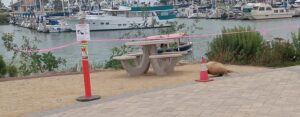 19-year-old Venturan Kiana Casey hardly left for 2-days trying to get help for the sea lion.
19-year-old Venturan Kiana Casey hardly left for 2-days trying to get help for the sea lion.
After lots of people trying to get her back in the water she just decided it was time to get back in so she just got up and went back in. A happy ending.
CIMWI is a part of the Marine Mammal Health and Stranding Response Program under the direction of NOAA’s National Marine Fisheries Service. Dedicated to positively impacting conservation through marine mammal rescue, rehabilitation, research and education to promote ocean and human health. CIMWI serves Santa Barbara & Ventura counties in Southern California.
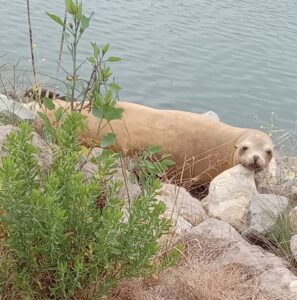 CIMWI has responded to over 500 live sea lions exhibiting signs of domoic acid and over 100 dead sea lions in Santa Barbara and Ventura counties. There have been over 20 live common dolphin strandings which succumb quickly to the neuro toxin. The toll for dead dolphins is up to 100. The numbers for live and dead stranded marine mammals suspected of having domoic acid rises by the hour.
CIMWI has responded to over 500 live sea lions exhibiting signs of domoic acid and over 100 dead sea lions in Santa Barbara and Ventura counties. There have been over 20 live common dolphin strandings which succumb quickly to the neuro toxin. The toll for dead dolphins is up to 100. The numbers for live and dead stranded marine mammals suspected of having domoic acid rises by the hour.
It is important to keep both people and pets away from the stranded animal. If pets are around the area, make sure they are on a leash. These animals are easily stressed by humans and pets.
Do not touch, feed, harass, cover, pour water on, coax/drag/push into the water or out of the surf zone, allow dogs near or take selfies with the animal. These are wild animals and they may bite!
Observe the animal from a minimum of 50 feet (the length of a school bus). Keep people and pets away from the stranded animal. Note the animal’s physical characteristics and condition.
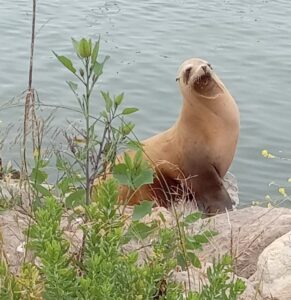 Determine the exact location of the animal. Be as accurate as possible and note any landmarks so CIMWI’s rescue team can easily find the animal.
Determine the exact location of the animal. Be as accurate as possible and note any landmarks so CIMWI’s rescue team can easily find the animal.
Call the CIMWI Rescue Hotline at (805) 567-1505. Provide your name, phone number, specific information about the animal and its location.
Marine mammals are federally protected under the Marine Mammal Protection Act. Violations can result in a civil penalty up to 11,000 as well as criminal penalties up to $100,000 and imprisonment of up to a year or both.
Please consider volunteering or donating to CIMWI to help with the rescue program. https://www.cimwi.org/
